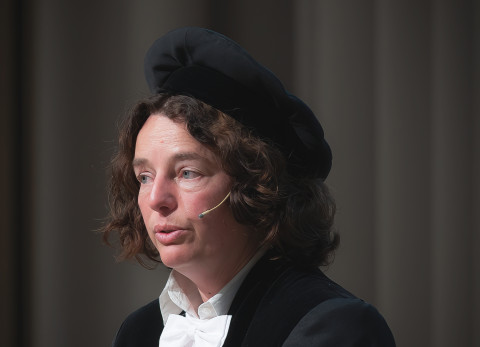Rewilding-professor Liesbeth Bakker: "Let nature surprise you"

Rewilding-professor Liesbeth Bakker: "Let nature surprise you"
Press inquiries
Let nature have its way and it will surprise you, Liesbeth Bakker said at her inauguration in Wageningen on 30 September as Europe's first professor of Rewilding Ecology. Instead of a "philosophy of doom" about nature, she sees room for a "philosophy of hope".
"Making more space for natural processes" is how Liesbeth Bakker defines rewilding in simple terms. Public interest in rewilding has been on the rise in Europe, thanks in no small part to the success of efforts to bring back wolves, bisons and other wild species. But with that interest comes some heated debate as well: how much 'wildness' can people ultimately handle?
(Text continues below the photographs)
Nature on life support
Traditional nature restoration, explained Eric Higgs (University of Victoria, Canada) at a symposium to mark Bakker's inauguration, focuses on a return to "native" conditions, i.e. before man dominated the landscape. And so "the n-word, novelty" is absent from most of the official literature: if our interventions result in something new, it can't really be restoration.
Take for instance the white-tailed eagles that now nest in the Oostvaardersplassen here in the Netherlands. The area lies below sea level, and normally eagles don't nest that low. So it's a novel development. But on the other hand, said Arie Trouwborst (Radboud University) at the symposium, it all depends very much on how far you're willing to go back.
If you're serious about returning landscapes to native conditions, you would also have to consider the reintroduction of elephants and lions: species that roamed Europe not all that long ago, historically speaking. The problem said Trouwborst, is that we have an automatic tendency to accept the current, reduced cirumstances as norm: a form of "collective amnesia".
"People often think that if you rewild something, you make a pristine wilderness without human intervention and they say that’s no longer possible", Liesbeth Bakker noted in her inaugural address. "And that's correct! You get the impression that nature here is something almost on life-support: confined to small areas, threatened and therefore weak."
Marker Wadden
That's the "philosophy of doom". But according to Bakker, "rewilding says: that doesn't mean we can do nothing. We can look at the situation as it is now, and we can always make it wilder." In contrast with traditional nature restoration, it steers on natural processes instead of going back to a certain state. "It's possible that there are species you hadn't defined beforehand."
Case in point: the Marker Wadden, a group of new, artificial islands in Lake Markermeer where Bakker has been leading the scientific research. A few years back, a breeding pair of gull-billed terns settled in the islands: the first in the Netherlands since 1958, when the terns' habitat near Rotterdam was destroyed to make room for heavy industry.
Bakker: "That’s the nice thing about letting nature have its way. It can come up with unexpected surprises. As soon as we step back and give room to nature, it will actually come back by itself. Instead of something weak, we can start looking at it as something really strong: that's what we call the ‘philosophy of hope’."
90% about people
The gull-billed terns in the Marker Wadden aren't a novelty as such, Bakker emphasised. To all intents and purposes, it looks like they 'recognised' a habitat that had actually been there before in the Netherlands, but that was lost because of human interference. Such dynamic interactions are one of the great advantages of rewilding.
But of course that makes it all the more important that people are on board with whatever rewilding projects are being considered. As Frans Schepers, one of the founders of Rewilding Europe, put it during the symposium: "Rewilding is 90% about people, 10% about nature."
It's hardly a coincidence then that Liesbeth Bakker postponed her inauguration until she could finally have a live audience again. Even though the special chair itself had been created at the height of the pandemic in 2020, by Wageningen UR with support from Rewilding Europe and NIOO-KNAW where Bakker continues to work as an aquatic ecologist.
Teaming up
"Always there’s the issue of people", Bakker said at the conclusion of her address. "The longer I work as an ecologist, the more I realise that even if we write very nice papers, it doesn't do anything for biodiversity restoration in the real world. Society will need to work with the conclusions we draw.”
At the start of the symposium, Dutch filmmaker Ruben Smit had suggested that scientists should look to what started their own fascination with nature and "translate facts into feelings" in order to convince people and get them on board. That's something Bakker couldn't agree more with.
She recently worked with communications experts from Utrecht University for a project on the controversies that have surrounded the return of the wolf. An "enriching experience", said Bakker, that sets a clear target for the future."Let's team up to rewild the world!"
Kijk hier naar de inauguratie van Liesbeth Bakker en het symposium
-
Ecosystem Restoration through Rewilding: People, Policy, PracticeSymposium voorafgaand aan de inauguratie van Liesbeth Bakker als buitengewoon hoogleraar Rewilding Ecology
-
The Ecology of Rewilding LandscapesInaugurele rede van Liesbeth Bakker als buitengewoon hoogleraar Rewilding Ecology




